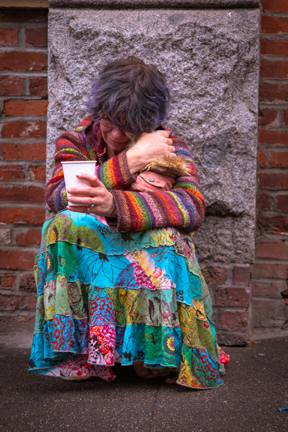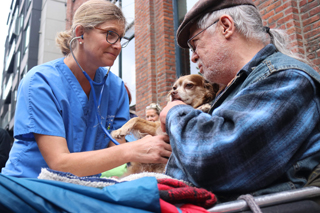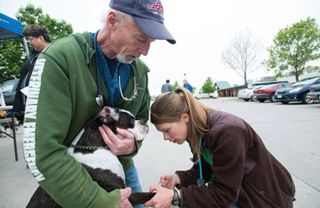
Tasha and Maggie 288

Photo by Danny Berger
Tasha Echols held Maggie while she waited for an appointment with Seattle Veterinary Outreach. For many people experiencing homelessness, their pets are a lifeline.
Homelessness is regularly seen as a crisis in the United States. On a single night in 2018, approximately 553,000 people were in emergency shelters, transitional housing or on the street, according to the Department of Housing and Urban Development. The point-in-time count was higher than in each of the previous two years.
Policymakers and activists recently have begun including pets of homeless people in discussions about how to get them into temporary shelter or permanent homes. There is a growing awareness that pets play a positive role in the lives of their homeless owners and may be an important asset in providing effective assistance.
In California, where the number of people experiencing homelessness reportedly surged 16% in the past year, and where nearly half of all the people without homes in America are thought to be located, the state has funneled hundreds of millions of dollars toward the problem. And for the first time this year, lawmakers set aside $5 million in the state budget for shelters that provide food, shelter and basic veterinary care for the pets of people experiencing homelessness. The funds will be disbursed as grants to qualifying programs by the state's Department of Housing and Community Development.
Katie Hanzlik, press secretary to California Sen. Bob Herzberg, said she knows of no other state with such a program. Herzberg was the lead author for SB 258, which encouraged shelters to provide care for companion animals as a way to draw more homeless people to shelter services.
"There are many solutions on the table that will surely make an impact on our current housing and homelessness crisis, but many of them are long-term solutions," Hanzlik told the VIN News Service by email. "Senator Hertzberg was also interested in finding ways to get people into shelter now. When we realized that many people on the streets refuse shelter because they can't bring their pets with them, this seemed like a common sense option that would deliver immediate results."
The text of SB 258 acknowledges the important role pets play in the lives of homeless people. "Pets provide warmth, security, and companionship to many who sleep on the streets," it says. "Pets also provide a type of normalcy, as providing food and water for their pets helps some homeless persons connect with reality."
Herzberg's bill passed the state Senate 37-0 in May, but it failed to get a vote in the Assembly. Nonetheless, Hanzlik said, the grants program can move forward without the bill because funding was independently approved in the budget.
While California has taken a top-down approach, several grassroots efforts build on a long tradition of veterinary professionals volunteering at free clinics and animal shelters and offering discounted services to pet owners of limited means. A mobile veterinarian in Seattle; a network of on-call practitioners for emergency interventions; and a coalition that establishes street clinics around the country are three examples of programs begun by individuals that provide support for people living on the street by helping their pets.
Seattle Veterinary Outreach
SVO clinic 288

Real Change photo by Jon Williams
At a summer clinic outside Real Change, a street newspaper in Seattle, Dr. Hanna Ekström examined Cosby while his owner held him close.
Dr. Hanna Ekström has a part-time mobile practice in Seattle, a city that ranks third in the U.S. for the number of people experiencing homelessness, according to Forbes and Statistica. Ekström remembers the moment she recognized that her professional expertise could play a part in addressing the city's plight.
She was driving and listening to a report on the radio about typhus carried by fleas spreading in homeless encampments in Los Angeles. "I looked out my window, and there was a homeless fellow and his dog," Ekström said. "And I thought, 'Hmmm. I wonder if that could happen here?' " That question sparked the idea of using her "vet-mobile" to bring free care to the homeless community.
It's the way she thinks. Ekström launched a chicken husbandry project to help rural poor in Nicaragua and still oversees a program to increase tooth brushing among children in that country.
The domestic venture began as a solo quest this year with a few informal forays offering veterinary wellness care in a neighborhood where many homeless people convene. "I didn't know how I'd feel about this, so I wanted to do that before I made too much noise," she said. But once she began, she had no qualms. "I've been enchanted by the people I've met."
After seven months, Seattle Veterinary Outreach (SVO), a 501(c)(3), keeps a schedule of repeat visits to partner organizations that provide services for homeless people including a food bank; a café and recovery support center; a street newspaper; and a shelter for women, children and families. By mid-October, SVO had seen 194 animals, microchipped 58, vaccinated 117, and provided 212 doses of flea and deworming medications among other treatments.
Ekström donates her time as executive director. Charging host organizations $150 per clinic to cover gas and insurance. She is assisted by a cadre of veterinarians, veterinary technicians and other assistants. Many are volunteers, but SVO has four employees, including a former client, a pre-veterinary medicine student and a pre-med student. She is looking for volunteer veterinarians, technicians and receptionists to work at least four times a year. She covers expenses through financial and in-kind donations. She has received two grants: one for $9,200 in May from the Seattle Foundation and another from the Jacobi Family Foundation for $25,000. She has other grant applications pending.
During a summer clinic at Real Change, a street newspaper that serves as a source of income for indigent and homeless vendors, Ekström examined a Chihuahua puppy. Sugar Magnolia, dressed in a tutu and sporting painted claws, sat in Tasha Echols' lap. They live together in an RV. Two months earlier, Echols had adopted Maggie for free off Craigslist.
Ekström squatted or knelt in the tight space that serves as an examination room in the back of her truck, gently examining the nervous dog. She pronounced Maggie healthy, to which Echols smiled broadly. They talked about Maggie's tendency to be a picky eater, and Ekström suggested cutting back on treats in favor of a more nutritious diet. Education is a big part of Ekström's work.
She vaccinated Maggie for leptospirosis, rabies, Bordetella, distemper and parvovirus; and provided medication for flea control and dewormer, a bag of dog food, and her cell phone number. Giving her number is one of the ways that Ekström goes an extra mile. Homeless clients can call her back with questions or to get test results, just like her paying clients.
Ekström and others who provide care for pets owned by people who are homeless say they are on the whole well-treated, socialized and happy.
During her examination of Maggie, the bulk of the conversation revolved around the dog, but Ekström sees her work as geared equally to the person as to the pet. Her long-term goal is to expand her operation to include one or more of the following: a human health practitioner, a psychiatrist or psychologist, a substance abuse counselor, and a caseworker, to make the most of each interaction. "Our ultimate goal is not just to provide veterinary care to the animals, it is to form relationships with people in need so that we can connect them to resources that may help them lift themselves into a healthier living situation for them and their pets," she said.
In addition to treatment records, she collects data from pet owners willing to provide it. The intake form asks questions such as: Has your pet ever been a barrier to getting housing? Have you ever had ringworm? Do you need reading glasses or dental work? Would you like mental health services? Ekström hopes some of the information can be used to help inform local policy and in a research collaboration she's begun with the Institute for Human-Animal Connection at the University of Denver.
As Echols relaxed, she talked about her life and her struggles with depression and addiction. "[Maggie] gives me purpose," she said, holding the puppy close. "I'm accountable to her. She's the love of my life. She keeps me from going to jail." As an example, she said, she no longer shoplifts, for fear she'll be arrested and lose Maggie.
Later, Ekström said that many homeless owners have similar stories about how their pets keep them on track.
She doesn't buy the notion that people who can't afford to care for a pet don't deserve one. "Many of these people have next to nothing. Their pet is their one lifeline," she said. "How can we take that away from them? I think what we need to do is facilitate them having that lifeline and help them through that lifeline to extend their relationships to others, so they can start connecting with society at large."
Pets of the Homeless
Like Ekström, Genevieve Frederick was inspired by a vision. During a visit to New York City, she saw a man panhandling with a beautiful, healthy dog at his side. "I wondered how and why the man reached this point in his life," she told VIN News. "And, what about his dog? The dog was not on a leash and could have run away at any time, but it was obviously devoted to the man. I was confused as to the reason anyone who is homeless, who could barely feed or take care of themselves, would even consider having a pet."
Back home in Nevada, she learned that homeless people with pets often go hungry so their pets can eat. "I realized it's because pets are nonjudgmental, provide comfort and are sometimes the only family or friends a person has," she said. "I knew I wanted to help by providing whatever food and aid I could."
Retired from a career in marketing, Frederick established Pets of the Homeless in 2008 with the mission of providing donated food and supplies to shelters in the Carson City area, where she lived. That effort mushroomed to 351 donation sites around the country. When a groomer who volunteered her services took a dog with serious skin issues to a local veterinarian, Pets of the Homeless paid for treatment. That gesture took the 501(c)(3) in a new direction.
Today, Pets of the Homeless describes itself as the only national organization dedicated to feeding and providing emergency veterinary care to companion animals owned by people experiencing homelessness. According to Frederick, the organization will try to provide free veterinary services to any homeless person with a pet needing emergency care who calls needing help.
Frederick, her daughter Renee Lowry (who is the executive director) and two case managers field the calls. They verify the status of the caller with someone like a social worker or a manager at a food bank, and then look for a veterinarian close to the caller. That might be someone they've worked with in the past or, if it's a new area for Pets of the Homeless, they will cold-call until they find a veterinarian willing to take the case. Pets of the Homeless pays the clinic directly, usually asking for a 20% discount. Treatments need to be pre-approved by the organization. The organization establishes a cap on what it can pay per pet, based on its annual fundraising — usually between $500 and $800. The average payment per pet in 2018 was $289.
Sometimes, veterinarians contact the organization when a homeless person comes in with a sick animal. Dr. Michael Pulver, a veterinarian in Carson City, had a case like that. Pulver first learned about Pets of the Homeless through a colleague, and has volunteered at its free annual clinic for several years and serves on the board of directors.
Recently, a man walked into his practice with a dog that was "flat out" with severe hyperkalemia due to a urethral obstruction. "He loved his dog and was heartbroken," Pulver said about the owner, who was living in his truck in the parking lot of a big box store. He contacted Pets of he Homeless. "They helped with money toward getting him in for surgery," Pulver said. "It was really helpful."
Pulver said most of the cases referred by Pets of the Homeless are less extensive, such as removing a foxtail or addressing skin issues. "It's not something we can do all the time, because honestly we wouldn't be here if we did that," he said, referring to the economic cost of extending the discount on a regular basis. "But, generally, it's been really rewarding for me and for my staff."
Pets of the Homeless says its network comprises hospitals in 451 cities in 47 states and Canada. The organization claims it took 17,000 calls between January 1, 2015, and August 1, 2019, and had facilitated 4,306 emergency visits at a cost of more than $800,000. Wound care, treatment for parvovirus and dental extractions are the most common reasons the pets require veterinary attention. Other common reasons are: hit by a car, limping, scratching, vomiting and skin issues.
Street Dog Coalition
Street Dog 288

Street Dog Coalition photo
Dr. Jon Geller held a patient during an early Street Dog clinic in Fort Collins in 2015, as Dr. Margo Hennet (who was a Colorado State University veterinary student at the time) drew blood.
Dr. Jon Geller describes himself as a "street veterinarian." Until recently, he was co-owner of a group of ER hospitals in Colorado. He sold one to independent practitioners in 2006; and three others to Pathway Vet Alliance last year. Now he is dedicated full-time to initiatives to help homeless and indigent people and their pets, starting with Street Dog Coalition, a 501(c)(3) that helps establish free wellness clinics around the country.
The origins of Geller's outreach are like Frederick's and Hanna's: It grew out of a chance encounter. He was in Nashville for a veterinary conference in 2015 when he saw a man with a dog who appeared to be homeless on a bridge. As Geller passed by, he said, the man gave him "this expectant look." Geller's response? He returned home to Fort Collins, Colorado, and soon headed up the first-ever Street Dog clinic across the street from a resource center for people experiencing homelessness. A team of veterinarians, veterinary technicians, veterinary students and other volunteers provided free care for 25 dogs and five cats.
Since then, the Street Dog Coalition has inspired additional clinics elsewhere in Colorado and in 30 cities from Honolulu to Omaha and Philadelphia to Fort Lauderdale.
"The rollout has all been organic," he said, "not necessarily intentional." He speaks about the effort at veterinary meetings and writes articles. "Veterinarians have reached out and said, 'I'd like to do this where I live,' " said Geller, who is the organization's executive director. "So we've kind of developed a protocol to make that happen. We provide them with everything they need and they'll do the work in their area." In exchange, the new clinics commit to running a minimum of two clinics a year.
Street Dog handles most of the fundraising and grant applications, and provides financial support for the hard costs of running the clinics and supplies. In addition, the group helps participants with logistics, insurance and paperwork.
Generally, Street Dog clinics provide basic preventive care, and diagnose and treat minor medical problems. They bring portable tools such as glucometers and urine test strips. If electricity is available to power microscopes, they can examine cells from masses taken with a needle and to look at skin scrapings for parasites like mites, which can cause mange. At the Fort Collins clinic, they use a wireless EKG and a wireless ultrasound probe, which they purchased with an equipment grant. They have ophthalmoscopes and otoscopes to do workups of eyes, ears and skin. They give fluids and check for heartworm and provide heartworm control products. They provide vouchers for low-cost and sometimes free spay and neuter surgeries, which the coalition purchases from area clinics.
Today, some Street Dog clinics and outreach efforts are done in conjunction with other medical professionals, in keeping with a One Health philosophy. One Health is the concept that the health of humans, other animals and the planet are intertwined.
In Chicago, for example, a Street Dog team travels with Chicago Street Medicine, a program involving medical students from the University of Illinois College of Medicine at Urbana-Champaign. In Detroit, a Street Dog clinic partners with Detroit Street Medicine — a program run by students from Wayne State University School of Medicine — and a social work team from Burners without Borders.
"Offering medical care to folks who might not ever get it living on the street is a big plus," Geller said. "They care enough about their pets to bring them in. They probably don't care enough about themselves to seek out routine care."
For those who do seek care for themselves, Street Dogs contributes veterinary care at multi-service health events serving low-income and homeless people.
Like Ekström, Geller has witnessed how important pets are for people. "They have come out and told me that they would probably have committed suicide without them," he said.
The work has given new meaning to his life, connecting him to a larger world. "I started seeing veterinary medicine as a bubble somewhat insulated from the swirling issues unfolding outside its boundaries: homelessness, abject poverty, racism, addiction," he said. "This work with the homeless has helped me break out of that bubble and feel more engaged."